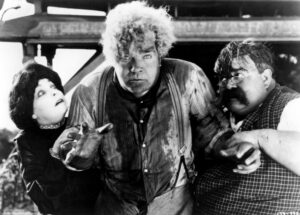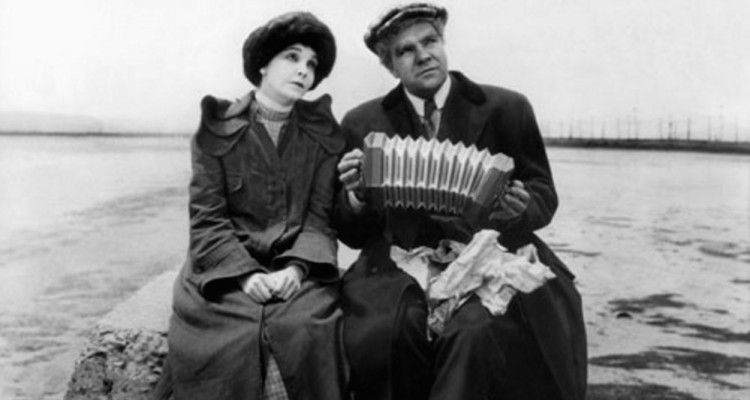Von Stroheim’s picnic at Schuetzen Park is a loose adaptation of Frank Norris’s episode in McTeague.
For the film, von Stroheim does not provide the food details. In the novel McTeague, Norris describes the Sieppe’s abundant picnic: clam chowder, loaves of rye bread full of grains of chickweed, wiener-wurst and frankfurter sausages, unsalted butter, pretzels, cold underdone sliced chicken with mustard, dried apples, a dozen bottles of beer, and a Gotha truffle (a baked brown pudding). Looking back on that day, McTeague remembers only the Gotha truffle. 
Even without food, the picnic is probably McTeague and Trina’s happiest time together. A screen legend tells us, “What a day that was for McTeague. . . what a never-to-be-forgotten day!” What is unseen as yet, however, is that their lives are destined to degrade inexorably. What is later revealed is McTeague’s inner savagery (a legend suggests is a “Foul stream of hereditary evil”) that makes him “crazy” and Trina’s obsessive greed and love of money.
Von Stroheim’s second picnic at the train station is his addition to the narrative foreshadowing their unhappy future. Short of cash and imagination, McTeague and Trina forgo the amusement park picnic. Instead, they meet at a train station and walk across a tidal flat where they sit on a sewer conduit surrounded by garbage and dead rats.
Tellingly, McTeague sits without helping Trina, who must hoist herself onto a high concrete casement. Unpacking his concertina (one of his great pleasures), McTeague asks what she would like him to play. Trina asks for the love song “Heart and Flowers,” but all McTeague (a nonbeliever) can play is “Nearer My God to Thee.” The irony is lost on Trina.
Another ominous warning is that it rains on their picnic. Despite this, and without any tenderness, McTeague abruptly proposes. Trina is appalled, And when he kisses her, she does not respond, a sure sign of her lack of sexual passion. But McTeague doesn’t notice, and the screen legend explains, “First…chance had brought them face to face: now . . . mysterious instincts, as ungovernable as the winds of the heavens, were knitting their lives together.” Trina boards a train for home, and McTeague, standing in heavy rain, is sure that he’s got her, “By God. . . I’ve got her!!” he exclaims.
*Von Stroheim omits Norris’ brutal picnic in which McTeague wrestles his friend Marcus, which begins friendly and degenerates when Marcus bites McTeague’s ear. Infuriated, McTeague turns savage and almost kills Marcus. 
See Erich von Stroheim. Greed (1924). Screenplay by June Mathis and Erich von Stroheim based on Frank Norris’ McTeague: A Story of San Francisco (1899); Thomas Quinn Curtiss, Von Stroheim (New York: Farrar, Straus & Giroux, 1971; Richard Kosznarski Von: The Life and films of Erich von Stroheim. New York: Limelight, 2001
Von Stroheim disavowed the MGM studio release because it was severely edited by Irving Thalberg, the studio head, Rupert Julian, a new director, and a revised screenplay by Finnis Fox.: https://archive.org/details/Greed1924VHS;

